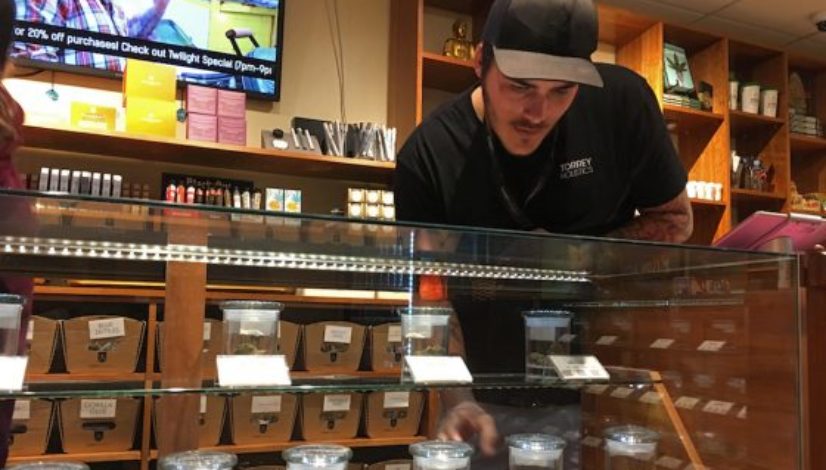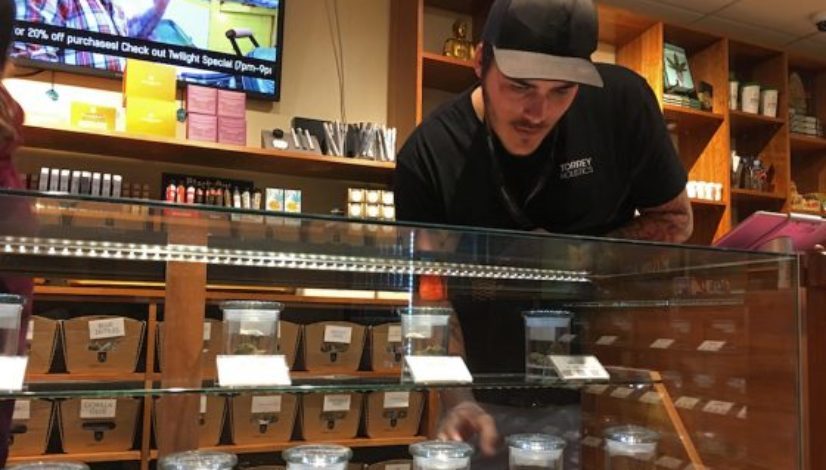Many California marijuana consumers looking to buy on Jan. 1 will have to wait

Published: Jan 1, 2018, 8:58 am • Updated: Jan 1, 2018, 8:59 am
By Jennifer Kaplan, Bloomberg
California will legalize recreational marijuana on Jan. 1, but consumers hoping to score some weed that day in two of its biggest cities are in for a bummer.
Los Angeles and San Francisco are among many municipalities that won’t have their licenses ready by the time marijuana sales become legal on New Year’s Day. Dispensaries are required to have local authorization before they can receive state permission to operate under a law approved by voters in a November 2016 referendum.
“If people are looking to go out on Jan. 1 and purchase adult-use cannabis, I think we would preach patience, because not everybody is going to be ready,” said Alex Traverso, a spokesman for California’s Bureau of Cannabis Control.
As of Thursday morning, the state had issued 60 licenses for medical retailers and 37 for adult recreational use, Traverso said. The regulatory body will be working through the weekend to try to get as many stores licensed as possible, with the hope of providing permits to several hundred, he said. Medical pot stores, which have been legal in California for more than two decades, must receive new state permits to continue operating.
The market for marijuana in California, the world’s sixth largest economy, is expected to hit $3.7 billion next year and more than $5.1 billion in 2019, according to the research firm BDS Analytics. Seven other states and the District of Columbia have legalized recreational weed, boosting a market that Cowen & Co. predicts will grow to $50 billion by 2026, up from $6 billion last year.
In California, shoppers thwarted in their attempt to buy state-sanctioned pot on Monday may decide it’s more convenient to keep doing it the old-fashioned way: on the black market, said Hezekiah Allen, executive director of the California Growers Association.
“If there are only 10 regulated dispensaries in the East Bay and I live 45 minutes from one of them, I’m going to call my dealer or my unregulated delivery service like I’ve done for the last five years,” Allen said. “What we need to do in California right now is ensure that every Californian that wants to consume cannabis can buy it at an affordable price, conveniently, from a licensed retailer.”
Related stories
- “Prohibition is Over”: Day one of recreational sales in California
- Photos: California launches legal recreational marijuana sales
- Medley of agencies tasked with enforcing new California marijuana laws
- Legal marijuana in California brings host of environmental rules
- Legal marijuana in California: What you need to know
Growers and manufacturers across the supply chain may find the unregulated market still ripe for business, Allen said. And while the new rules will probably come with increased enforcement, many California growers have faced unsuccessful crackdowns before.
“If history has proven anything, it’s that enforcement is relatively ineffective and we really need to get market forces on the side of the solution here,” he said. “This is a symptom of a ballot measure that went too fast. To assert that California could go from zero to fully operational in just over a calendar year is frankly pretty ignorant from a policy perspective.”
Businesses looking to go through the proper legal channels to sell marijuana face a potpourri of regulations. San Francisco will allow existing medical dispensaries to begin recreational sales on Jan. 5, according to Kellsi Booth, a cannabis attorney at Silverman & Milligan. They will need to get a temporary operating license from the state. Angelenos will have to wait a bit longer. The city will start accepting applications Jan. 3, but it will take weeks, if not months, for the filings to be processed. West Hollywood will have sales as soon as Jan. 2.
San Diego, Sacramento and Berkeley are among the cities where recreational pot will be available on Jan. 1.
“In a lot of places up and down California, people will be turned away and they’ll have to come back the day after or later in the week,” said Daniel Yi, a spokesman for MedMen, a Los Angeles-based cannabis-management and investment firm that owns or operates 10 dispensaries, three growing facilities and two manufacturing plants.
When the new permits go live, shoppers will have a significantly smaller pool of dispensaries from which to choose than under the more lax rules governing medical marijuana. There were more than 1,700 locations operating in Los Angeles in 2017, according to Controller Ron Galperin. But only 139 of them were doing business in compliance with the city’s regulations, according to a report by Galperin’s office released in June.
“You’re going to have a lot of displaced consumers that now have to find new retailers,” said Jordan Lams, co-founder and chief executive officer of Moxie, a Lynwood-based cannabis-extract manufacturer. “You’ll end up with a lot of stores that will likely be bogged down with long lines and people transitioning to the newer legal outlets. It’s going to be a wild ride, to say the least.”
Dispensaries and producers must make changes to bridge the gap between the old cannabis industry and the new one. For example, MedMen purchased 100,000 child-proof bags in order to comply with new packaging rules, Yi said. Inventory left in stores from 2017 is legal to sell so long as the products have appropriate labels saying they are untested and out of compliance with the stricter laws.
Still, cannabis entrepreneurs are used to rapidly changing rules. While there may not be one big day to celebrate, the state’s move to legalize is a significant moment for industry advocates who have been on the slow march toward legalization since the early 1970s.
“It’s going to be historic, regardless of when it happens,” the Bureau of Cannabis Control’s Traverso said.
Topics: California, California legalization, california regulations, California sales, legalization




